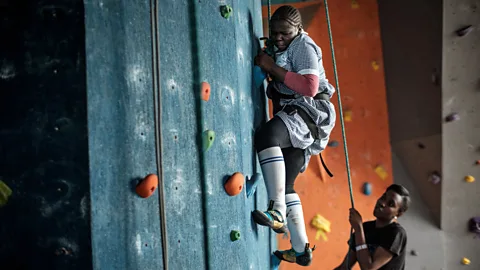The biggest myths of the teenage brain

Our brain changes hugely during adolescence. New research shows how we can use this transformation to help teens achieve their potential.
Terri Apter, a psychologist, still remembers the time she explained to an 18-year-old how the teenage brain works: "So that's why I feel like my head's exploding!" the teen replied, with pleasure.
Parents and teachers of teens may recognise that sensation of dealing with a highly combustible mind. The teenage years can feel like a shocking transformation – a turning inside out of the mind and soul that renders the person unrecognisable from the child they once were. There's the hard-to-control mood swings, identity crises and the hunger for social approval, a newfound taste for risk and adventure, and a seemingly complete inability to think about the future repercussions of their actions.
In the midst of this confusion, adolescents are consistently assessed for their academic potential – with ramifications that can last a lifetime. No one's fate is sealed at 18 – but an impeccable school record will certainly make it far easier to find a place at a prestigious university, which will in turn widen your options for employment. Yet the emotional rollercoaster of those years can make it extremely difficult for teens to reach their intellectual potential.
It is only within the past two decades or so that scientists have been able to chart the neural changes across this core period of development, and decode the mysteries of the teenage brain.
These exciting new insights not only help explain why teens feel and act the way they do. They also show that some of the traits that adults tend to find difficult or baffling in teenagers can be turned into a strength, and used to acquire skills and insights at a time when the brain is still malleable.
After all, adolescence is also a time of various cognitive leaps. Teens are building on the basics they had learnt as young children to develop sophisticated and mature ways of thinking, including more abstract reasoning and a more nuanced "theory of mind".
"Fifty years ago, in schools, it would not have been seen as necessary for students to know about puberty," John Coleman, a clinical psychologist and author of The Teacher and the Teenage Brain. "And I think in 20 or 30 years, we'll be asking why we weren't helping students to understand what's going on in their brains. It can make a real difference."
 Getty Images
Getty ImagesUnderstanding the teenage brain
It is no wonder that many teens, throughout history, have complained of feeling misunderstood. Our traditional explanations for adolescent behaviour have been frustratingly crude. Their risk-taking, rebelliousness, impulsivity and general irritability can be so easily blamed on things like ignorance and immaturity, or their "raging" hormones and increased sex drive.
Often their complaints of emotional anguish simply invite ridicule. As the neuroscientist Sarah-Jayne Blakemore, author of Inventing Ourselves: The Secret Life of the Teenage Brain, recently put it: "It is not socially acceptable to mock and demonise other sectors of society... But it is, strangely, acceptable to mock and demonise teenagers."
Even the more scientific theories had painted a rather unsympathetic picture of teenage life that will have only added to their sense of alienation. In the 50s, for example, the psychoanalyst Anna Freud proposed that teens are attempting to "divorce" their parents, cutting their ties to the family so that they can move on with their lives. The idea was that "the teen was working to oust the parent from their internal furniture," says Apter, the psychologist and author of The Teen Interpreter: A Guide to the Challenges and Joys of Raising Adolescents.
While these previous explanations may have a grain of truth, they fail to consider the nuances of most teens' experiences. Apter's interviews with teens and their parents suggest that adolescents often desperately crave the approval and acceptance of their parents. So while they certainly do want independence, it is not at any cost. Such observations aren't very compatible with the divorce theory.
If we are to help teens, Apter argues that we need to pay closer attention to the subtleties of what adolescents are actually going through – including the enormous social challenges that they are navigating. That necessarily includes a recognition of the embarrassment that may arise from the physical changes to the body, and the shifting social expectations placed on them. In such cases, they can start to feel alien to themselves.
At the same time, we need to acknowledge the anatomical changes that are occurring within the brain. With the invention of functional MRI scans, scientists can now peek inside this "black box" throughout the lifespan.
 Getty Images
Getty ImagesHow do teenagers' brains change?
As we mature from children to adults, our brain undergoes massive changes. Here are some of the most important ones:
- The frontal cortex builds and then prunes networks throughout adolescence, which helps the brain become more efficient. This allows for a huge expansion in skills.
- In the frontal and parietal lobes, the brain similarly reinforces the most important connections. This shows up in brain scans as a noticeable increase in "white matter".
- As these changes happen, some brain areas develop more quickly than others, which may affect behaviour. For example, areas associated with reward tend to develop faster than those linked to self-control, which may encourage impulsive decisions.
Early childhood, is, of course, the period of greatest change. In the first few months of life, the brain builds many connections between neurons, before pruning back the redundant neural pathways, which allows for more efficient networks. This innate "plasticity" means the young child's brain is particularly malleable, allowing them to go from a bawling baby to a walking, talking toddler.
In many areas of the brain – such as those involved in sensory processing – these networks tend to stabilise long before adolescence, which makes it harder to learn certain perceptual or motor skills, such as language or music, after the early "sensitive period".
The frontal cortex shows a different trajectory, however, and it continues to build and then prune networks throughout puberty and adolescence and into early adulthood. In the frontal and parietal lobes, the brain also reinforces the most important connections by adding a fatty insulating sheath – known as myelin – which improves the transmission of signals. In brain scans, this shows up as a noticeable increase in "white matter" over adolescence. These developing areas are important for a host of skills, including emotional regulation, maintaining attention, problem solving and abstract reasoning.
While teen brains may have already lost some of the malleability of early childhood, this continued development means that they are still very sensitive to intellectual stimulation with a huge capacity for learning. This allows them to build on the academic skills and knowledge that they had started to develop in childhood and develop more sophisticated ways of experiencing the world.
Unfortunately, the neurological and psychological changes taking place may sometimes feel overwhelming, a fact that can go a long way to explaining some of the behaviours that cause so much disruption at school and at home.
 Getty Images
Getty ImagesRebels with a cause
Consider teens' famous risk-taking, rule-breaking and general rebelliousness.
Brain imaging studies show that the regions of the brain associated with reward generally develop more quickly than those associated with inhibition and self-control. On average, they have greater activity in their dopamine signalling – a neurotransmitter associated with pleasure and curiosity – compared to both adults and younger children, with bigger spikes when they experience something that is novel or exciting.
In this light, it's little wonder that teens are more likely to be tempted to try new experiences. One consequence may be impulsive and risky decision making, but this curiosity might bring advantages too: teens can test lots of different experiences which may be useful to guide their personal decisions as an adult. (Rushing into an unsuitable romance might help them to learn what kind of partner would suit them better, for example.)
Interestingly, data suggests that teens today may not be so easily tempted by the sex, drugs and rock 'n' roll of years before, but their generally more open-minded attitude will still be evident in many other areas of their lives, such as their fascination with new technology. Teens' dogged pursuit of their own interests – and their disregard for authority – can even help to fuel technological, social and political change. "You have a new generation that's going to explore boundaries – you have a great deal of inventiveness and adventurousness and creativity," says Apter.
For parents and teachers who would prefer that the teens in their care spend more time studying, this may be frustrating. But when channelled towards meaningful causes, this fearless energy can help invigorate the rest of society, for example when it comes to tackling climate change or other global issues. Teenagers and young adults have even bravely fought dictatorships, while older generations acquiesced.
Mood swings
Teens' mood swings can be similarly explained by the interplay of physiological and psychological processes associated with maturation. For one thing, many teens have greater fluctuations in neurotransmitters and hormones such as serotonin, GABA and cortisol – all of which can modify their mood. "If you take serotonin, it's the 'feel-good hormone' – and when it's down you're going to get a very low mood," says Coleman.
Teens are also experiencing increased activity in the medial prefrontal cortex, which is involved in processing and responding to other people. Research shows that activity in brain areas related to self-evaluation tends to peak during mid-adolescence, especially for information related to status. This ability to understand social interactions and networks is incredibly important in the formation of teens' friendships, but it may mean that they are especially sensitive to slights and signs of hostility, increasing their susceptibility to social anxiety.
Parents of teens may be surprised at how long they can spend pondering their own feelings. This is partly because they haven't yet learnt how to interpret them and respond constructively. It's so much harder to process a disappointment over an exam result, say, if you've never faced a serious failure before.
When teens appear to be "over-dramatic", they're simply learning to navigate the complexities of their emotional world by themselves – skills that will be essential in later life.
Sleepy heads
Last, but not least, there's teens' famous lethargy. This is often mistaken for laziness or apathy, or a stubborn refusal to go to bed at a "reasonable time" (another example of their famous rebelliousness). In truth it is beyond their control; their body clocks are programmed in a way that is simply out of sync with adults' rhythms.
We feel sleepy when levels of melatonin rise in the brain at night – and, in the morning, we will wake up feeling alert once it has dropped below a certain level. For teens, melatonin simply rises and falls later in the day than adults – meaning that they will feel alert and active when their parents are ready to hit the hay, and tired and drowsy in the early morning, when their parents may have already been up for hours.
"Virtually no adults will have melatonin left in their brains at nine o'clock in the morning," says Coleman, "but around half of teenagers do."

Family Tree
This article is part of Family Tree, a series that explores the issues and opportunities families face today – and how they'll shape tomorrow. You might also be interested in other stories about children and young people's health and development:
Climb other branches of the family tree with BBC Culture and Worklife.
Tapping the brain's 'reward circuits'
All of these findings should be of serious interest for parents and teachers hoping to guide teens through life's challenges, including the demands of school – which plays such a central role in the adolescent years. These lessons may be particularly important now, as teens learn to adjust to their normal life after the stresses of the pandemic.
Consider discipline. It is natural to feel frustrated with teen rebelliousness – but their extreme emotional and social sensitivity means that they are unlikely to respond well to anger. "Even though it's very tempting to shout, it's really counter-productive," says Apter. "They are so alert to the emotional message that they won't be able to hear any of the logic you're trying to impart."
For more effective discipline, Apter suggests asking the teen to make amends for their actions. If the teen has been neglecting their studies by partying too hard, parents might emphasise how they can earn their right to socialise by proving that their studies are now under control – rather than simply calling them lazy, or grounding them.
Given the increased dopamine activity in teens' reward circuits, praise and positive feedback should also help, especially if they are offered quickly. In many schools, students receive their grades weeks after completing their tests or coursework – which, Coleman believes, reduces the excitement and satisfaction of a good result. "The faster you get feedback, the more impact it has," he says. Simply shortening that process, and offering more opportunities to praise students for their hard work, could therefore pay dividends, Coleman says.
Then there's the question of sleep. Ideally, schools would change their schedules so teens could start their lessons later, and they should avoid giving tests in the first half of the morning. "I feel very strongly that schools have to start thinking about this," says Coleman. At the very least, teachers and parents should give teens some slack when they seem drowsy in the morning. They are experiencing something akin to jet-lag – and the last thing they need is more stress to add to their burden.
When it comes to the act of studying itself, Coleman believes that many students could benefit from better knowledge of successful learning techniques.
Rather than simply passively re-reading passages before an exam, attempts to actively re-generate the material from memory – by, say, summarising what they have just learnt or trying to answer fresh questions on the topic – tend to be more successful. This kind of meaningful engagement would make the most of teens' brains’ malleability, and their capacity to soak up facts and process complex information – as long as they find it interesting. (You can read BBC Future's advice for smarter study skills here.)
Embracing change
If you do nothing else, simply expressing a genuine interest in what teens are feeling, and helping them to understand the reasons for the challenges they are facing, may itself pay huge dividends.
When discussing her work with teens, Apter has had many positive encounters. She notes that teens are often particularly receptive to the idea that the changes in their brains can be shaped by their actions. The truth is that the more they practice skills like self-control and the regulation of their emotions, the better they will become – a fact that is empowering.
With the right support, that mental explosion may feel less like a shocking jolt, and more like a burst of fireworks: dramatic, yes, but also creative, awe-inspiring and beautiful.
--
David Robson is a science writer and author of The Expectation Effect: How Your Mindset Can Transform Your Life, published by Canongate (UK) and Henry Holt (USA) in early 2022. He is @d_a_robson on Twitter.
--
